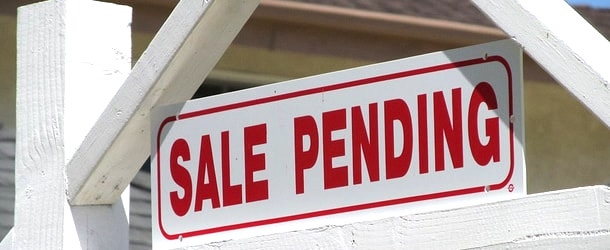
Mortgage Q&A: “Do mortgage payments decrease?”
While everyone always seems to focus on mortgage payments adjusting higher, there are a number of reasons why a mortgage payment may actually decrease over time.
No really, there are, so let’s take a look at how this pleasant surprise could happen, shall we…
Mortgage Payments Can Decrease on ARMs
- While perhaps not as common as the payment going up
- Monthly payments can drop if you have an adjustable-rate mortgage
- But you’ll need the associated mortgage index to decline in the process
- And your lender may have a built-in floor, so basically don’t bank on it
If you have an adjustable-rate mortgage, there’s a possibility the interest rate can adjust both up or down over time, though the chances of it going down are typically a lot lower.
Still, it is viable to take out an ARM, hold it throughout its initial fixed-rate period, then wind up with a lower rate once it becomes adjustable.
You may remember that now infamous interest rate reset chart, the one that showed billions of dollars worth of mortgages resetting from their fixed-rate period into their scary adjustable period.
Well, the damage wasn’t nearly as bad as it originally appeared because many of the mortgage indexes tied to those loans plummeted to rock-bottom levels and/or all-time lows.
As a result, some homeowners who stayed in those seemingly “exploding ARMs” may have actually seen their mortgage payments fall. And the savings could have been significant.
For example, say you took out a 5/1 ARM set at 3.5% for the first 60 months with a margin of 2.25% tied to the 12-month LIBOR.
After five years, the rate may have fallen to around 2.5% with the LIBOR index down to just 0.25%.
Yes, it is possible to lower your mortgage rate without refinancing!
When You Pay Down Your Mortgage (But It’s Not Automatic)
- Payments can also go down if you make a large lump sum payment
- But you’ll need to get your mortgage lender to recast your loan
- Doing so will allow them to re-amortize it based on a lower outstanding balance coupled with your original loan term
- Without a recast, extra payments won’t automatically lower future payments
If you decide to pay off a large chunk of your mortgage, you can ask the mortgage lender to recast your loan (if they allow it).
This essentially re-amortizes the mortgage so the new, smaller balance is broken down over the remaining months left on the loan.
Your monthly mortgage payment is adjusted lower to reflect the smaller outstanding principal balance, but your mortgage rate doesn’t change.
While this could increase household cash flow, you may be better suited to pay off your mortgage early by making your old, higher monthly payment despite the lower balance.
[Pay off the mortgage or invest instead?]
Keep in mind that mortgage payments won’t decrease automatically simply by making extra payments. All that will accomplish is a quicker payoff period and interest savings.
For example, if you pay an extra $500 per month on a $300,000 mortgage set at 4%, you’ll pay off the loan 11 years and 8 months early. But payments will be the same every month until the loan is paid in full.
In other words, future payments won’t go down to reflect earlier ones, but because the loan will be paid off sooner than scheduled, you will save more than $92,000 in interest over the life of the shortened loan.
Similarly, a mortgage payment doesn’t just decrease over time as it is paid off, like it might be with a credit card or revolving account like a HELOC.
Instead, the monthly payment is pre-determined for the life of the loan, even if you chip away at it along the way.
If You Refinance Your Home Loan to a Lower Rate
- This is the most common reason why mortgage payments drop
- And largely why homeowners choose to refinance their mortgages
- If interest rates are low and you’re looking for some payment relief
- It might be time to trade in your old home loan for a new one via a refinance
Here’s a no-brainer. If you want a lower mortgage payment, look into a rate and term refinance.
Because mortgage rates are very low at the moment, your mortgage payment will probably decrease significantly if you refinance now, assuming you haven’t done so recently.
This is one of the most popular and easiest ways to lower your mortgage payment with minimal effort.
It just requires a little bit of work on your end in terms of shopping around, submitting a loan application, getting approved, and making it to the finish line.
For example, if your current interest rate is set at 4%, it might be possible to refinance it down to 3%, which depending on the loan amount could lower your payment significantly and save you a ton in interest too.
However, it’s not always a good time to refinance. Sometimes rates can be higher, and other times the closing costs might exceed the benefit, especially if you don’t plan to stay in the property for the long-haul.
[When to refinance a mortgage?]
If you’re not sure whether to refinance or not, consider the refinance rule of thumb argument.
Shop Your Homeowners Insurance, Look Into a Tax Reassessment
- You can also look beyond your mortgage rate to gain payment relief
- It might be possible to lower your payment by shopping around for homeowners insurance
- Or getting a tax reassessment if you feel your property value has dropped
- A simple escrow surplus can also result in a lower payment
Lastly, be sure to shop your homeowner’s insurance each year, as it is typically included in your mortgage payment.
If you can snag a lower home insurance premium, your mortgage payment may decrease as a result. Another pretty simple way to save money…
Assuming you didn’t waive escrows, your loan servicer will collect a portion of property taxes and homeowners insurance with each principal and interest payment, then pay these items on your behalf.
If either decrease from a year earlier, your total housing payment may go down as well after they run their annual escrow analysis.
Also look into a tax reassessment of your home if you feel it is overvalued.
If property values have been on the decline, you may be able to save some money on property taxes by asking your county recorder’s office to reassess your property.
Of course, it doesn’t always work out as planned so tread cautiously.
Remember, a mortgage payment is typically expressed as PITI, which stands for principal, interest, taxes, and insurance.
Take the time to address each component if you want to save money on your monthly housing costs.
See also: Do mortgage payments increase?



